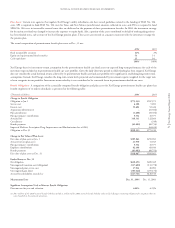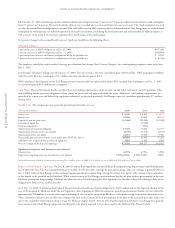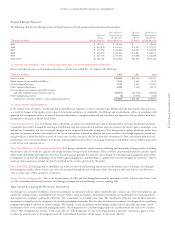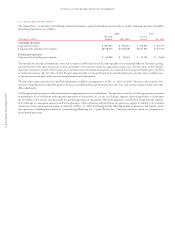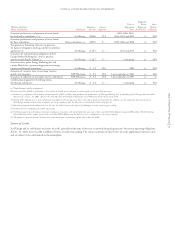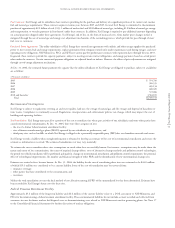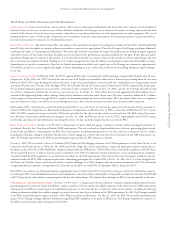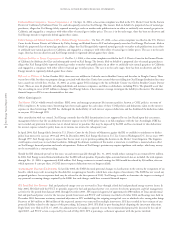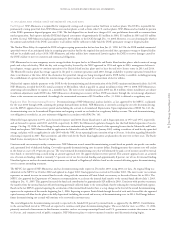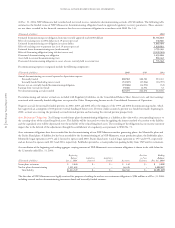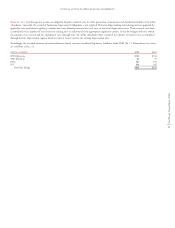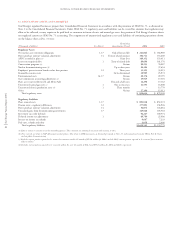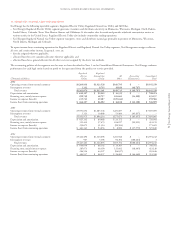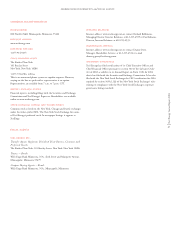Xcel Energy 2004 Annual Report Download - page 79
Download and view the complete annual report
Please find page 79 of the 2004 Xcel Energy annual report below. You can navigate through the pages in the report by either clicking on the pages listed below, or by using the keyword search tool below to find specific information within the annual report.
NOTES to CONSOLIDATED FINANCIAL STATEMENTS
Xcel Energy Annual Report 2004
77
Third Party and Other Environmental Site Remediation
Asbestos Removal Some of our facilities contain asbestos. Most asbestos will remain undisturbed until the facilities that contain it are demolished or
renovated. Since the intent is to operate most of these facilities indefinitely, Xcel Energy cannot estimate the amount or timing of payments for final
removal of the asbestos. It may be necessary to remove some asbestos to perform maintenance or make improvements to other equipment. The cost of
removing asbestos as part of other work is immaterial and is recorded as incurred as operating expenses for maintenance projects, capital expenditures
for construction projects or removal costs for demolition projects.
Federal Clean Water Act The federal Clean Water Act addresses the environmental impacts of cooling water intakes. In July 2004, the EPA published
phase II of the rule that applies to existing cooling water intakes at steam-electric power plants. The rule will require Xcel Energy to perform additional
environmental studies at 12 power plants in Minnesota, Wisconsin and Colorado to determine the impact the facilities may be having on aquatic organisms
vulnerable to injury. If the studies determine the plants are not meeting the new performance standards established by the phase II rule, physical and/or
operational changes may be required at these plants. It is not possible to provide an accurate estimate of the overall cost of this rulemaking at this time
due to the many uncertainties involved. Preliminary cost estimates range from less than $1 million at some plants to more than $10 million at others,
depending on site-specific circumstances. Based on the limited information available, total capital costs to Xcel Energy are estimated at approximately
$59 million. Actual costs may be significantly higher or lower depending on issues such as the resolution of outstanding third-party legal challenges
to the rule.
Leyden Gas Storage Facility In February 2001, the CPUC approved PSCo’s plan to abandon the Leyden natural gas storage facility (Leyden) after 40 years
of operation. In July 2001, the CPUC decided that the recovery of all Leyden costs would be addressed in a future rate proceeding when all costs were
known. In 2003, PSCo began flooding the facility with water, as part of an overall plan to convert Leyden into a municipal water storage facility owned
and operated by the city of Arvada, Colo. In August 2003, the Colorado Oil and Gas Conservation Commission (COGCC) approved the closure plan,
the last formal regulatory approval necessary before conversion. Leyden is expected to close by Dec. 31, 2005, and the city of Arvada will take over the
site. PSCo is obligated to monitor the site for two years after closure. As of Dec. 31, 2004, PSCo has incurred approximately $4.8 million of costs
associated with engineering buffer studies, damage claims paid to landowners and other initial closure costs. PSCo has accrued an additional $1.3 million
of costs expected to be incurred through 2006 to complete the decommissioning and closure of the facility. PSCo has deferred these costs as a regulatory
asset and believes that these costs will be recovered through future rates. Any costs that are not recoverable from customers will be expensed.
In December 2003, a homeowners association petitioned the EPA to assess the threat of a natural gas release from the Leyden facility pursuant to
Section 105(d) of the Comprehensive Environmental Response, Compensation and Liability Act of 1980, as amended, (CERCLA) 42 U.S.C. section
9605. The EPA completed its review in October 2004 and concluded that the risk to nearby residents is relatively low. The EPA referred the matter
to its Resource Conservation and Recovery Act program. On Nov. 24, 2004, the EPA sent a letter to the COGCC requesting that the COGCC contact
Xcel Energy and request certain information concerning the closure. To date, no formal request has been received by PSCo.
PSCo Notice of Violation On Nov. 3, 1999, the U.S. Department of Justice filed suit against a number of electric utilities for alleged violations of
the federal Clean Air Act’s New Source Review (NSR) requirements. The suit is related to alleged modifications of electric generating plants located
in the South and Midwest. Subsequently, the EPA also issued requests for information pursuant to the Clean Air Act to numerous electric utilities,
including Xcel Energy, seeking to determine whether these utilities engaged in activities that may have been in violation of the NSR requirements. In
2001, Xcel Energy responded to the EPA’s initial information requests related to PSCo plants in Colorado.
On July 1, 2002, PSCo received a Notice of Violation (NOV) from the EPA alleging violations of the NSR requirements of the Clean Air Act at the
Comanche and Pawnee plants in Colorado. The NOV specifically alleges that various maintenance, repair and replacement projects undertaken at
the plants in the mid-to-late 1990s should have required a permit under the NSR process. PSCo believes it has acted in full compliance with the Clean
Air Act and NSR process. It believes that the projects identified in the NOV fit within the routine maintenance, repair and replacement exemption
contained within the NSR regulations, or are otherwise not subject to the NSR requirements. PSCo also believes that the projects would be expressly
authorized under the EPA’s NSR equipment-replacement rulemaking promulgated in October 2003. On Dec. 24, 2003, the U.S. Court of Appeals for
the District of Columbia Circuit stayed this rule while it considers challenges to it. PSCo disagrees with the assertions contained in the NOV and intends
to vigorously defend its position. As required by the Clean Air Act, the EPA met with PSCo in September 2002 to discuss the NOV.
If the EPA is successful in any subsequent litigation regarding the issues set forth in the NOV or any matter arising as a result of its information requests,
it could require PSCo to install additional emission-control equipment at the plants and pay civil penalties. Civil penalties are limited to not more than $25,000
to $27,500 per day for each violation, commencing from the date the violation began. The ultimate financial impact to PSCo is not determinable at this time.
NSP-Minnesota NSR Information Request On Nov. 3, 1999, the U. S. Department of Justice filed suit, related to alleged modifications of electric
generating plants located in the South and Midwest, against a number of electric utilities for alleged violations of the Clean Air Act’s NSR requirements.
Subsequently, the EPA also issued requests for information pursuant to the Clean Air Act to numerous other electric utilities, including Xcel Energy,
seeking to determine whether these utilities engaged in activities that may have been in violation of the NSR requirements. In 2001, Xcel Energy responded
to the EPA’s initial information requests related to NSP-Minnesota plants in Minnesota. On May 22, 2002, the EPA issued a follow-up information
request to Xcel Energy seeking additional information regarding NSR compliance at its plants in Minnesota. Xcel Energy completed its response to
the follow-up information request during the fall of 2002.


